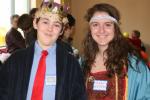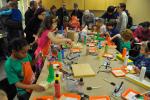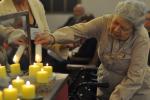This talk highlights the gendered and biomaterial effects of Torah study through the eating, bleeding and learning bodies in contemporary Orthodox women’s yeshivas, otherwise known as seminaries. Yeshivas are traditional schools for rabbinic text study with roots in the late antique and medieval Middle East. Schwartz’s larger book project, "Yeshiva Quirls: A Textual Ethnography of Jewish Reproduction," frames yeshivas as sites of educational, ethnoreligious and gendered reproduction by connecting two moments of transition in the yeshiva’s gendered history: 1. The development of rabbinic educational environments in late antiquity as alternative sites of male lineage 2. The crossing over of women into these historically male environments with the creation of Orthodox women’s yeshivas in the late 20th and early 21st centuries. Focusing on the second of these transitions, this talk will follow contemporary women’s yeshiva students’ learning bodies as they are reshaped by Torah study's gendered spatial practices. Introducing these student bodies as important sites of Jewish knowledge production, the talk will show how the above institutional shifts were also shifts in gender/sex, and in kinship/reproduction, and in Jewish bodies as sites of Jewish transmission. As part of the “means” of Jewish reproduction, Torah study operates as an important technology in the creation not only of Jewish texts, but of Jewish bodies. Likewise, Jewish gender does not precede Torah study; rather, Torah study creates Jewish gender.





